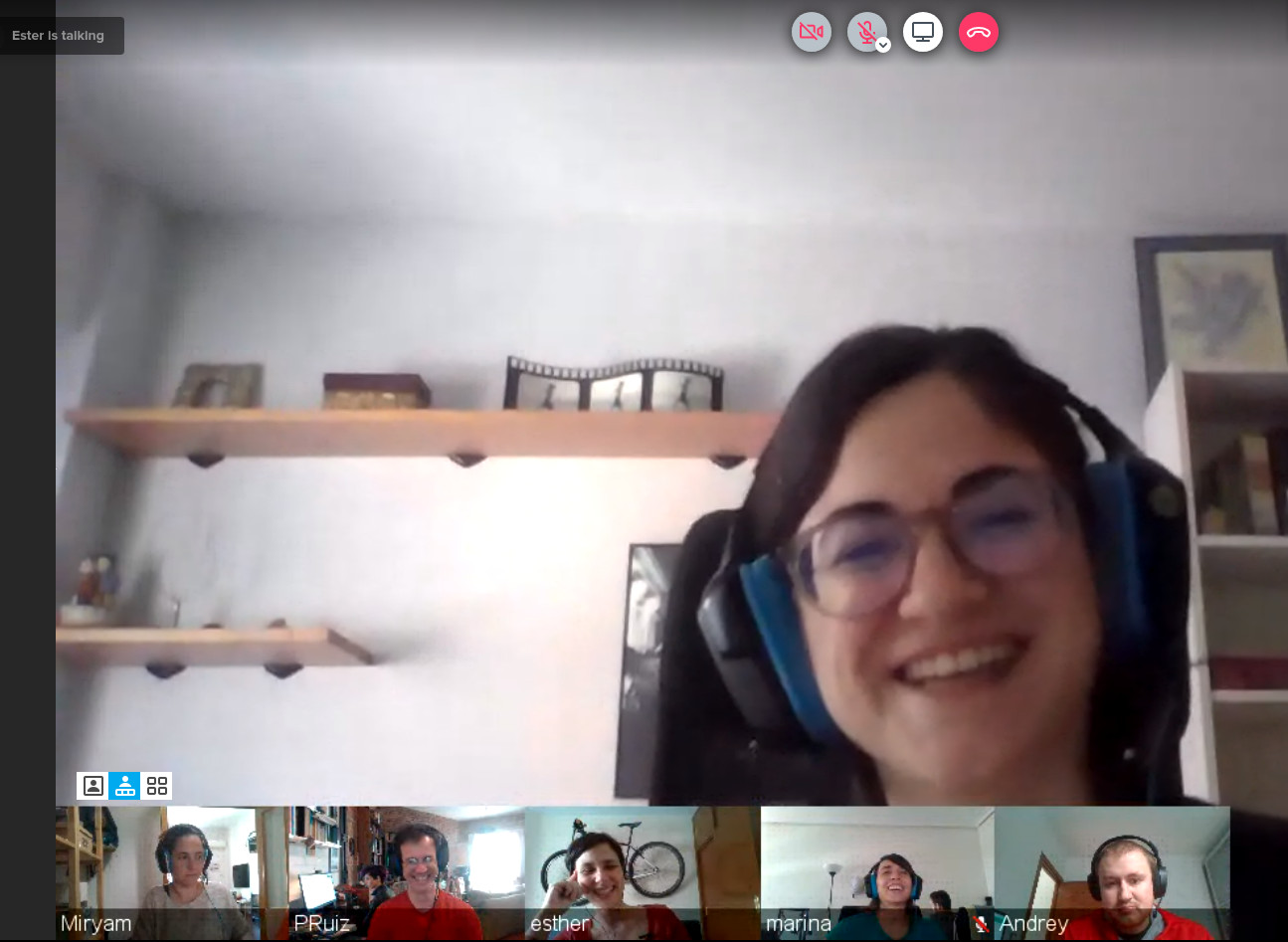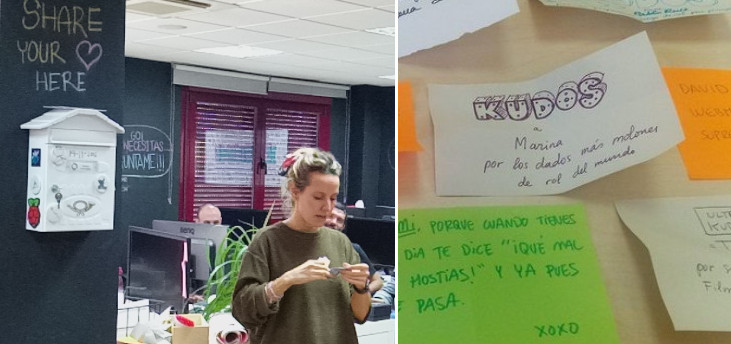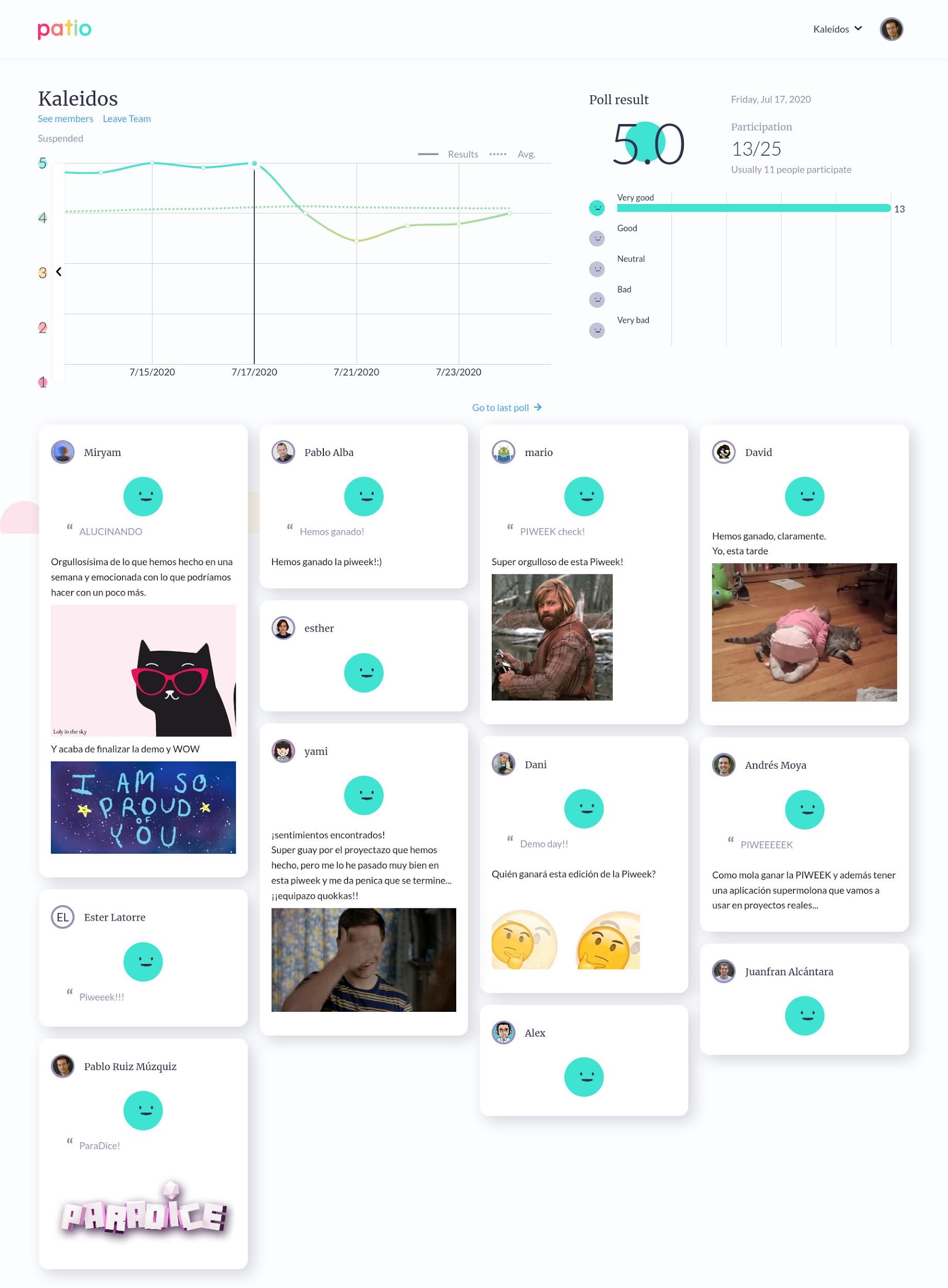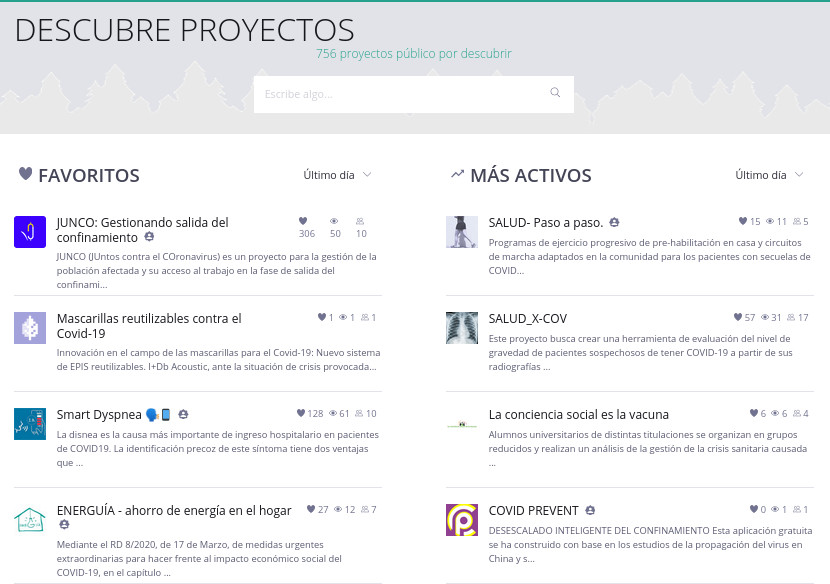On March 14 the state of alarm was declared in Spain. A week earlier Kaleidos had implemented a COVID-19 protocol. It was very simple: social distancing and hygiene measures were promoted as well as a strong suggestion to work from home as much as possible. On March 9 we updated it to mandate working from home save for justified exceptions. One of these was to welcome Ester Latorre, a new hire, at our Madrid office. Approximately 6 people met her that day and since then we have not seen each other in person. The next onboarding, Natacha Menjibar‘s, was 100% online.
In this post we review the main measures and initiatives we’ve taken since March. All of them have been aimed to improve life-work balance, solidarity, mental well-being and employment security. We will update it weekly if necessary.

Kaleidos Measures
Since the pandemic started, our motto has been “we’d rather do too much than keep adding new measures all the time”. We’ve tried to go ahead instead of waiting for confirmation. Now, more than ever, better safe than sorry.
Working hours reduction from 8 to 6 hours without salary reduction
“Chariot” (Direction Committee) had its monthly steering committee on April 6 and discussed how to effectively help a better work-life balance in Kaleidos, especially for people with dependents. It was decided to offer a reduction of working hours from 8h to 6h without reducing wages. This measure was designed to help everyone to better cope with the confinement. It has been prolonged until September 15 and allows kaleiders, on a voluntary basis, to choose working beyond these 6 hours to support the productivity of Kaleidos in solidarity. This solidarity must be exercised with individual responsibility taking into account their personal situation.
Enforced remote work
Before our COVID-19 we could work from home 3 days a week from Tuesday to Friday. We were completely ready for the transition to full-remote, but even so we did not boast about it because we enforced it due to the pandemic. We decided not to openly boast about our know-how because we didn’t want to contribute to trivialize the circumstances of companies suddenly forced to go full remote. There were debates of questionable quality about how remote work could emerge stronger from this crisis and we chose not to give lessons to anyone or generate more noise.
Pre-COVID, all of us worked from 10am-2pm, being the rest of working hours flexible. Now, there is even more flexibility to maximize work-life balance.
Remote Breakfast
Every day there is a voluntary virtual breakfast at 11am. The goal is to get together for half an hour enjoying herbal teas, coffees, toasts and various treats and keeping alive the bond between kaleiders. It also helps share experiences, news or initiatives.
After some months, we decided to move from a daily breakfast to a weekly lunch: we meet Fridays, from 2 to 3. This way we finish our work week sharing good conversations and (really) bad jokes.
“Telekudos”
In the office we have a mailbox to introduce “kudos”: little thank you notes to colleagues both for work-related issues and for organizing activities out of the office (reading club, barbecues, board games, role playing …). We open the mailbox once every few weeks. Some weeks into full remote, we realized we missed being able to write kudos. So now we do it digitally and every few weeks meet at a videoconference to read them together.

Psychological counseling for coping during COVID-19
We believe that, especially at this time, it is important to pay special attention to mental health issues. Because of this we contacted José Manuel Campos, a psychologist who had already prepared workshops for us (assertive communication and emotional management. First, we collected information (voluntarily and anonymously) about the main issues causing distress through a form prepared by José Manuel. Then he prepared 4 thematic sessions we had during the first week of May.
PATIO, a webapp made in Kaleidos to help share your daily mood
Several years ago we developed a web app called “KALHAPPY”. It asks daily “Are you happy in Kaleidos?” through an email linked to the web app. Answers are numerical from 1 to 5 and shared with everyone. Its use is voluntary and it also allows you to add text or gifs to elaborate your answer. It helps us to know how other kaleiders are doing even if we don’t see each other that day. Now we use PATIO, an improved version of KALHAPPY. It is easier to download and install by other groups or companies, so we thought it was a good time to finish PATIO development due to current circumstances.

Initiatives we’re worked at
We’ve got involved in several initiatives against the social problems caused by COVID. Some of them at the “institutional” level and others at a personal level. Here we explained briefly the “institutional” ones and at this post (Spanish) the personal ones.
Frenalacurva.net
Frena La Curva (FLC) (Spanish for “stop/slow down the curve”) is a citizen-driven initiative that started thanks to institutional and governmental support and quickly evolved into a grass-roots project aimed at helping people cope with the COVID crisis and the necessary lockdown. It started as a carefully crafted forum where dozens of volunteers collected online resources, curated information and ideas to bring insight and tools to the general public. Once that was launched, we looked elsewhere for more collaborative power and we decided that we needed to evolve into a map. Plenty of maps showed the virus spread, our map would show, instead, how help between people was also spreading even faster. Our goal was, therefore, twofold, provide useful online resources and map the needs, help and public services around you.
Ushahidi was one of the few platforms we analyzed. We were expecting similar initiatives from local governments and councils (the first to announce “apps” or “webs”) but when we saw that these platforms were oriented to the self-diagnosis of covid19 symptoms or how to proceed with lock-down measures, we saw the need to go for a full-fledged Map. Ushahidi has proven to be an amazing platform. It has some limitations but also many strengths. It’s definitely more than enough, especially if we, the people, regardless of a map or not, play our part.
You can read more about FLC Maps in this post (Spanish) and Ushahidi’s website.
Hackathon VenceAlVirus
The Community of Madrid, through the Department of Science, contacted us to inquire about our experience in hackathons and the suitability of our platform Taiga to manage a massive online one. After several meetings to fully understand the challenge, we decided to join in, help with methodology and offer our infrastructure support with Taiga. Our open-source project management platform would play a leading role in the registration of 7000 participants and more than 700 projects.
More info: “El hackathón multitudinario #VenceAlVirus visto desde Kaleidos y Taiga”.

Next Steps
This exceptional situation, as much as we would like to return to normalcy as soon as possible, is going to last for a long time. We are going to deal with a health, social and economic crisis such as we have never experienced after World War II. At Kaleidos we will continue to take action and support initiatives in line with our values. These are Feminism, Generosity, Honesty, Free Software, Responsibility and Transparency. Making use of our privilege to make a positive impact on society through technology. In this crisis, more than ever, it will be necessary to be supportive, self-critical and optimistic.
